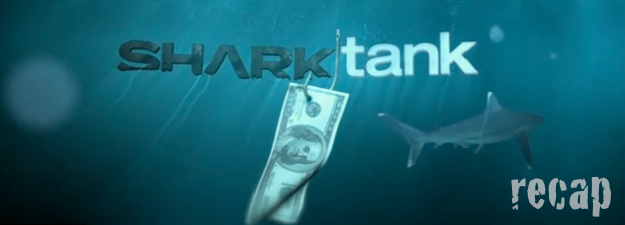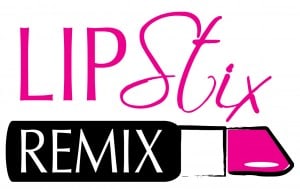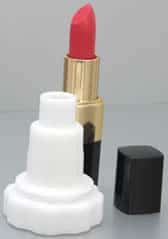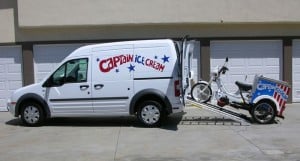
The following is by Brenden Sherratt of In The Shark Tank.
Tonight’s episode of Shark Tank featured for different entrepreneurs, each competing for the Sharks’ money. These entrepreneurs must convince the Sharks to invest at least the amount they asked for or they walk away with nothing.
 Jill Quillin came up with an innovative way for women to save money on their lipstick. LipStix Remix is a system that allows you to melt down your old lipstick and poured into a mold to create a brand-new lipstick. Jill was looking for $105,000 for 30% of her business. Jill needed the sharks help in order to get her product to market, she had currently been selling her product at a mall kiosk, she managed to sell 800 units herself.
Jill Quillin came up with an innovative way for women to save money on their lipstick. LipStix Remix is a system that allows you to melt down your old lipstick and poured into a mold to create a brand-new lipstick. Jill was looking for $105,000 for 30% of her business. Jill needed the sharks help in order to get her product to market, she had currently been selling her product at a mall kiosk, she managed to sell 800 units herself.
 It was obvious that Jill knew her stuff, she knew the best way to sell her product was on TV. This meant she needed to get a deal with Kevin Harrington a pioneer in the infomercial business. She was convinced that after a series of infomercials she would be able to get her product in stores. For every kitshe sold on the infomercial she expected to sell ten in stores.
It was obvious that Jill knew her stuff, she knew the best way to sell her product was on TV. This meant she needed to get a deal with Kevin Harrington a pioneer in the infomercial business. She was convinced that after a series of infomercials she would be able to get her product in stores. For every kitshe sold on the infomercial she expected to sell ten in stores.
Barbara was first to act offering half the money, but she required another shark to come into the deal. Daymond offered $105,000 for 40% of the business. And Kevin Harrington joined Barbara but required 40%. Daymond was convinced the Barbara was not needed in the deal and tried to convince Kevin to drop her, but after some jostling Barbara, Daymond and Kevin made an offer for the full amount for 50% of the business. Jill saw the value in all three sharks, in on the deal, so she accepted.
 Tim Gavern was hoping to make a deal with the sharks for a piece of his business, Captain Ice Cream. Tim planned to sell and franchise is novelty moped ice cream business. He was willing to give up 25% of his business for an investment of $48,000 from the sharks. Tim would wholesale the ice cream to his franchisees, and sell them a moped for $7000 each. In a good day a franchisee can expect to sell $200 worth of ice cream in four hours, which according to Tim would translate into about $25-$50,000 a year in income. Even with a markup of 400% on ice cream, this business is not going make anyone into a millionaire overnight. None of the sharks invested.
Tim Gavern was hoping to make a deal with the sharks for a piece of his business, Captain Ice Cream. Tim planned to sell and franchise is novelty moped ice cream business. He was willing to give up 25% of his business for an investment of $48,000 from the sharks. Tim would wholesale the ice cream to his franchisees, and sell them a moped for $7000 each. In a good day a franchisee can expect to sell $200 worth of ice cream in four hours, which according to Tim would translate into about $25-$50,000 a year in income. Even with a markup of 400% on ice cream, this business is not going make anyone into a millionaire overnight. None of the sharks invested.
Next into the tank was Michael Schiayone and his business Caffeindicator (the website is broken). Michael had developed a method for testing whether coffee was decaf or regular. He’d been able to combine this with sugar packets, when a regular coffee was poured on the packet it would turn pink. The obvious advantage of this would be that you don’t inadvertently drink decaf and hour before you go to bed. Michael was looking for $200,000 in exchange for 25% equity in the business.
Michael, a mechanical engineer, had patented the product and was planning to license the product to one of five major sweetener companies. Michael recognized it would be more profitable to make a small fraction of a penny off of each order, versus the risk of producing your own packets and the costs involved with that. He expected that the sweetener companies might use his product to gain market share, he was predicting a bidding war. Michael even suggested that he might sell the patent to the highest bidder, and it would be up to them whether they use it or bury it.
Robert was first to jump at it, offering $200,000 for 60% of the business. This was contingent on him getting a deal with the sweetener companies. Kevin H. followed Roberts lead and offered $200,000 for 50% of the company with the same contingency as Robert. Michael wisely accepted Kevin H’s deal.
 Last into the shark tank was Jeff and Annie Hughes and their business Legal Grind. Legal grind is a coffee house where middle-class people can get access to legal resources, such as lawyers and other basic legal services. They were looking for $200,000 for 15% of their business. Jeff and Annie tried to do a funny pitch, but the sharks were not impressed, and their pitch fell flat on its face.
Last into the shark tank was Jeff and Annie Hughes and their business Legal Grind. Legal grind is a coffee house where middle-class people can get access to legal resources, such as lawyers and other basic legal services. They were looking for $200,000 for 15% of their business. Jeff and Annie tried to do a funny pitch, but the sharks were not impressed, and their pitch fell flat on its face.
Their goal with their business was to franchise, bringing legal services to middle-class America. Jeff is a lawyer, he been operating the business since 1996, bringing in about $200,000 in gross sales a year.
 The sharks questioned the legality of the business (waitress giving legal advice), and the scalability, it would be hard to find another set of Jeff and Annie’s out there. The couple then surprised the sharks by saying that they had over 100 franchising requests. Daymon recommended that they take a down payment from a certain amount of the franchisors and they would have all the money they need it, in order to build a business into a franchise.
The sharks questioned the legality of the business (waitress giving legal advice), and the scalability, it would be hard to find another set of Jeff and Annie’s out there. The couple then surprised the sharks by saying that they had over 100 franchising requests. Daymon recommended that they take a down payment from a certain amount of the franchisors and they would have all the money they need it, in order to build a business into a franchise.
In the end the sharks were not able to invest in the business, and Jeff and Annie walked away without an investment.
If you are enjoying this season of Shark Tank please take a second to send ABC a message here, and ask for a second season of Shark Tank.
Follow Brenden on Twitter at @SharkTankABC.